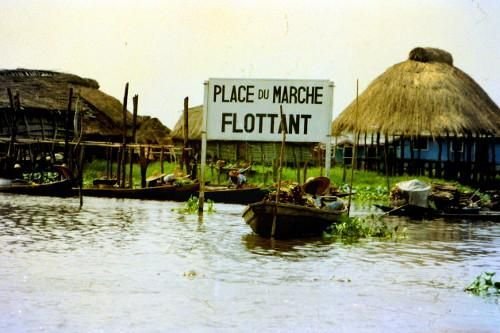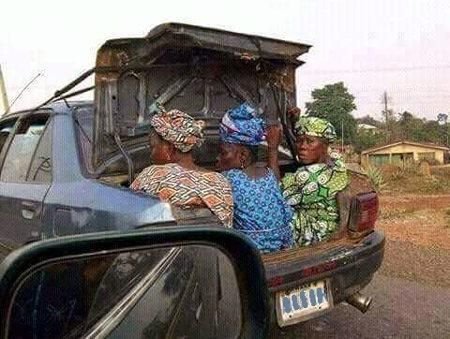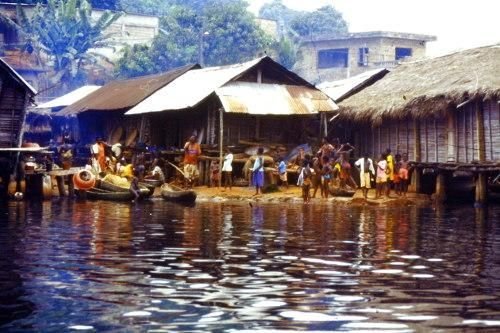This is an authorized translation in English of a post in French by @terresco: Rencontres avec l'Afrique : Au pays du Vaudou
As my primary language is not English, there are probably some mistakes in my translation.
Remember that the person who speaks here is NOT me, Vincent Celier (@vcelier), but @terresco, a French guy.

Benin
When I found my first house in Abidjan, there was a caretaker and a cook who were already working for the old owners. It was quite new and a little strange for me to have house staff but they were visibly worried about their situation. Immigrants in Ivory Coast, the guardian whose sad story I already told was Burkinabé and the cook was from Benin.
The latter, Jonas, settled with his family in a neighborhood on the outskirts of Abidjan, invited us to visit his house and to introduce his family. He had two children, and a year later, a third pointed his nose. Jonas asked us for a leave to return to Benin for the birth and invited us to come to his country during our next vacation.
In the family in Jonas
To get to Benin by car takes a little time. The problem are the borders. Ghana, Togo and finally Benin, three borders to the program. For the return we had chosen another route, through Burkina Faso: we had a longer route but had only one border. Ivory Coast being our country did not give us any problem.

We received a wonderful welcome in the family, saying that we were at home is below the truth. We were constantly thanked for employing the son, as if we were giving them a gift. Those are paradoxical moments. We feel happy for what we receive, we let ourselves be convinced that we are a good boss, a good person. What weakness! Because we are ashamed not to give and do more. When we think about the wages we pay, ridiculous for our income. And yet we pay a little more than the neighbors, it gives us good conscience.
The baby was born, we wanted to let Jonas and his family enjoy the event with their loved ones, we asked for the road two days later. Asking for the road is a beautiful expression we use when we leave someone, we ask permission to go somehow. It is often necessary to ask several times, a way to tell you that they regret your departure.
We had some way to go and a friend to join, with whom we would go up the country to reach the W National Park, a funny name, that become the [Pendjari National Park] in Burkina Faso.
A formidable police officer

Wanting to take advantage of the negotiation, I went first and quickly confessed to a small mistake causing the payment of a small fine but the immediate opening of the passage. Quickly parked I came back to watch the show.
It was the phase of papers, registration, visa, international license, insurance ... everything in order. We went to the equipment. My friend was playing the clock, wasting time on the police allowed waiting for other potential customers and trying to sympathize with the policeman. He asked, "Do you have the pharmacy kit? The boyfriend was arguing, "Ah, do you need a pharmacy kit?" "The policeman was enthusiastic" Yes sir you must be able to help ". The friend seemed embarrassed to the delight of his interlocutor, then feigning a sudden idea, was searching for a long time. Anxiety and disappointment of the policeman at the triumphant appearance of a box marked with the red cross. We went to the triangle, then to the jack, the spare bulbs. And each time the same show. It lasted more than three hours, the friend won his bet, in Abidjan we heard about it for months.

Benin is also the country of Voodoo. Despite the bad reputation that has been made over time, voodoo is only a form of animism. Sometimes diverted because everyone believes it very hard. For the record, it was the slaves sent to the Caribbean who exported voodoo.

-- @terresco
01: Encounters with Africa: Ivory Coast, by @terresco
02: Encounters with Africa: Abidjan, a daily pleasure, by @terresco
03: Encounters with Africa: The Tuaregs of Agadez, by @terresco
04: Encounters with Africa: The Tuaregs of Agadez, part 2, by @terresco
05: Encounters with Africa: On the way to the Dogon country, by @terresco
06: Encounters with Africa: Among the Dogon of Bandiagara, by @terresco
07: Encounters with Africa: The Gold Coast, by @terresco
08: Encounters with Africa: Where was born a desire to go elsewhere, by @terresco
09: Encounters with Africa: The time of failures, by @terresco
10: Encounters with Africa: The Promised Land, by @terresco
11: Encounters with Africa: The Land of the Upright Man, by @terresco
12: Encounters with Africa: From Bobo to Ouagadougou, by @terresco
From Cape Town to Mombasa series:
01: Africa, the long crossing
02: From Cape Town to Mombasa: South Africa
03: From Cape Town to Mombasa: Namibia
04: From Cape Town to Mombasa: Botswana
05: From Cape Town to Mombasa: Zimbabwe
06: From Cape Town to Mombasa: Zimbabwe, part 2, by @terresco
07: From Cape Town to Mombasa: Zimbabwe, part 3, by @terresco
08: From Cape Town to Mombasa: Zambia, by @terresco
09: From Cape Town to Mombasa: Malawi, by @terresco
10: From Cape Town to Mombasa: Tanzania #1, by @terresco
11: From Cape Town to Mombasa: Tanzania #2, by @terresco
12: From Cape Town to Mombasa: Tanzania #3, by @terresco
13: From Cape Town to Mombasa: Tanzania #4, by @terresco
14: From Cape Town to Mombasa: Kenya, by @terresco
Mention the word ‘voodoo’ and most people conjure images of dolls riddled with nails, and spooky witches casting spells on the innocent. However, voodoo isn’t some black magic or evil witchcraft as portrayed in Hollywood movies. In fact, it’s one of the oldest religions in the world, with hundreds of years of history.
Most Voodoo is white magic, to summon the good spirit from our ancestors. And what most people dont know is that Good spirit is stronger than bad. Each Voodoonou (fetish priest) has a specialty. There also is a dark side. For instance, you could ask a Voodoonou, who specializes in death, to make somebody die. He will put you through some tasks to test your intent. The tasks include drinking a woman’s menstrual blood and retrieving the heart of a dead person.
In Benin, Fetish followers, (about 50% of the population) practice animism as part of Voodoo, worshiping the Python. They believe that the snake will not bite, but if you kill one, even accidentally, you will die.
Each animal is used for a specific ceremony, such as ground elephant bone to cure elephantiasis.
Voodoo is completely normal in Benin.
People across West Africa, especially Togo, Ghana and Nigeria hold similar beliefs but in Benin it is recognised as an official religion, followed by some 40% of the population.
Voodoo Day is a public holiday and there is a national Voodoo museum.
It has none of the negative connotations it has in the West and many of those who are officially Christian or Muslim also incorporate some Voodoo elements into their beliefs, especially in times of crisis.
But Voodoo is more than a belief system, it is a complete way of life, including culture, philosophy, language, art, dance, music and medicine.
Thank you for your explanation of Voodoo, it is really appreciated.
Your welcome Sir @vcelier
great post by @terresco it's nice of you to translate it to english for him :)
Thank you @melissakellie
Racism clouds our view of Voodoo. It is rooted in slavery and intricately connected to this hemisphere’s political and social evolution. Voodoo was first practiced in America and the Caribbean by slaves of African descent, whose culture was both feared and ridiculed. Slaves were not considered fully human. Their religion was dismissed as superstition, their priests were denigrated as witchdoctors, their Gods and Spirits were denounced as evil.
One of the only successful slave revolutions in modern history occurred in Haiti in the late 1700s. Slaves of African descent overthrew European rulers and took control of the country. Many slaves were Voodooists, and some of their military leaders were priests who inspired and organized their communities to fight for freedom. The Haitian Revolution provoked fear in other European and American colonies that were reliant on vast numbers of slaves as plantation labor. The imagery and vocabulary of Voodoo (and other Afro-Caribbean religions) became threatening and ingrained in those cultures as something horrifying, associated with bloodshed and violence. It was brutally repressed in most places. It became taboo.
Over time, American culture became fascinated by this mysterious tradition and began to depict it in movies and books as sensationalized horror. Hollywood created a mythology around“Voodoo” practices that we have taken as truth. “Voodoo” has become part of modern folklore as something evil that can hurt us. Most of the disturbing images fixed in our minds are something we saw in a movie.
Such a great post keep up the good work 👏
Great travelling. I like your post
Thanks
What a hectic journey!
Very nice explanation
So when are you coming to #Nigeria?
Benin are our neighbours